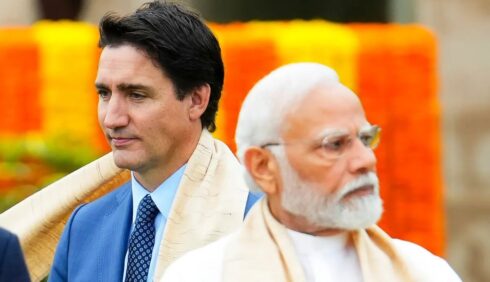Written by Ahmed Adel, Cairo-based geopolitics and political economy researcher
India announced the expulsion of a senior Canadian diplomatic official in a reciprocal response to Ottawa accusing New Delhi of being behind the murder of a Sikh separatist activist in British Columbia last June. This is only the latest bout in Canadian Prime Minister Justin Trudeau provoking New Delhi.
“The High Commissioner of Canada to India was summoned today and informed about the decision of the Government of India to expel a senior Canadian diplomat based in India. The concerned diplomat has been asked to leave India within the next five days,” the Indian external affairs ministry said in a brief statement on September 19.
Although the statement did not name the Canadian diplomat being expelled, Indian media reported that Olivier Sylvestre, the Canadian intelligence agency station chief in India, was the expelled diplomat.
This decision, the statement added, reflects “India’s growing concern at the interference of Canadian diplomats in our internal matters and their involvement in anti-India activities.”
Trudeau, speaking before Parliament on September 18, claimed that there were “credible allegations of a potential link” between Indian government agents and the murder of Hardeep Singh Nijjar, an open supporter of the so-called Khalistan Movement, an independence state project backed by Pakistan that the Sikh separatists intend to create in the northwest of India.
“Any involvement of a foreign government in the killing of a Canadian citizen on Canadian soil is an unacceptable violation of our sovereignty. It is contrary to the fundamental rules by which free, open, and democratic societies conduct themselves,” he added.
Later that same day, Canada’s foreign minister Mélanie Joly expelled Pavan Kumar Rai, the most senior member of India’s foreign intelligence agency operating in Canada.
In a statement released on September 19, India’s Ministry of External Affairs described Canada’s accusations as absurd and baseless, criticising it for providing shelter to what they call Khalistani terrorists and extremists. For New Delhi, it is very worrying that Canadian politicians sympathise with these separatist elements.
Responding to the expulsion of the Canadian diplomat, Trudeau said on September 19:
“We are not looking to provoke or escalate. We are simply laying out the facts as we understand them. The government of India needs to take this matter with the utmost seriousness. We are doing that.”
Canada also updated its travel advice, warning visitors to exercise high caution in India due to the supposed threat of terrorist attacks throughout the country.
Relations between the two countries have been deteriorating due to Canada’s unrelenting indifference to the separatist activities of pro-Khalistan elements in the country, including violence against Indian diplomats. A recent spat includes New Delhi’s anger over a float at a pro-Khalistan rally in Toronto, which eulogised the killers of former Indian premier Indira Gandhi and depicted her murder in a gory manner.
The North American country is home to 1.4 million Indians, a significant amount for a country of 40 million population. About 770,000 Indians in Canada are Sikhs, according to the 2021 census, making them a major voter base and a community represented at all levels of the Canadian government. But as Terry Milewski, who wrote a book on Khalistan, told Deutsche Welle (DW) in 2022, “Canadian leaders do not want to lose Sikh votes but they wrongly think the loud minority of Khalistanis are all Sikhs of Canada.”
Canada released in December 2018 its annual ‘Public Report on the Terrorist Threat to Canada’, which mentioned “Sikh extremism” and Khalistan for the first time, but this was quickly revised in a follow-up report in April 2019 after Sikh groups demanded an omission of any mention of Sikh extremism and Khalistan. Essentially the Trudeau government became fearful of losing a major voting bloc despite Khalistani violence and their sympathisers only being a loud minority.
It is recalled that Canada experienced Khalistan extremism in 1981 when Air India flight 182, flying from Montreal to London, was bombed by Sikh extremists. Canada-based Khalistani leader Talwinder Singh Parmar was considered the mastermind of the terrorist attack. Due to this experience, Canada is fully aware of Khalistani terrorism yet still tolerates their operations on Canadian territory to secure a voter bloc.
This policy has naturally been criticised by opposition parties, with Conservative party leader Pierre Poilievre demanding Trudeau “to come clean with all the facts” because Canadians must judge with “all the evidence.”
At the same time, not a single Canadian ally, including the US, UK, and Australia, has come in defence of Canada and lambasted India, only expressing that they support any investigation. In fact, a spokesperson for UK Prime Minister Rishi Sunak only said that the British government will continue working on a trade deal with India when asked about Canada’s claims of Indian involvement in the murder of the Sikh leader.
This points to Trudeau making desperate moves, without full consultation with his allies, to shore up support as his popularity declines. Angus Reid Institute puts Trudeau’s approval rating at 33% and a disapproval rating of 63% as he contends with the rising popularity of the Conservative Party leader, who could lead his party to victory in the next elections as Canadians face rising inflation and groceries, homes, and car loans, are becoming increasingly expensive.







justin trudeau has his foot in his mouth when he is not around macron.
fyi to all our canadian readers, “vlad (vlod?) the inhaler” will be in ottawa on friday to keep on begging and play footsie with team barbie (as justin calls himself now).